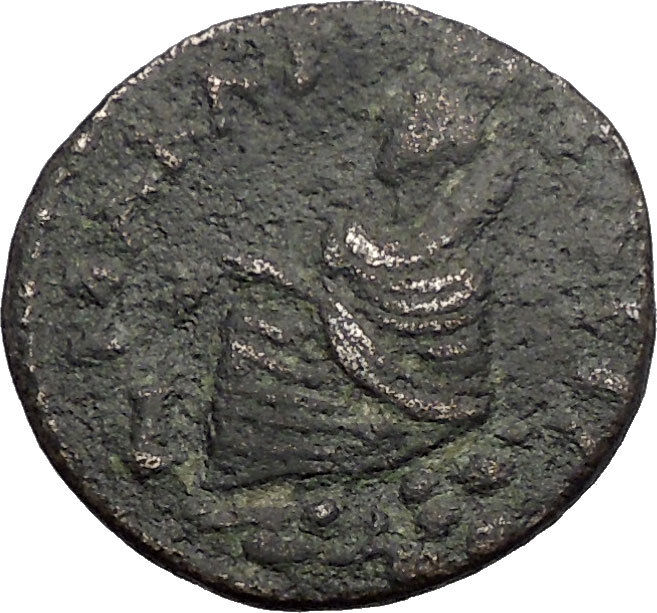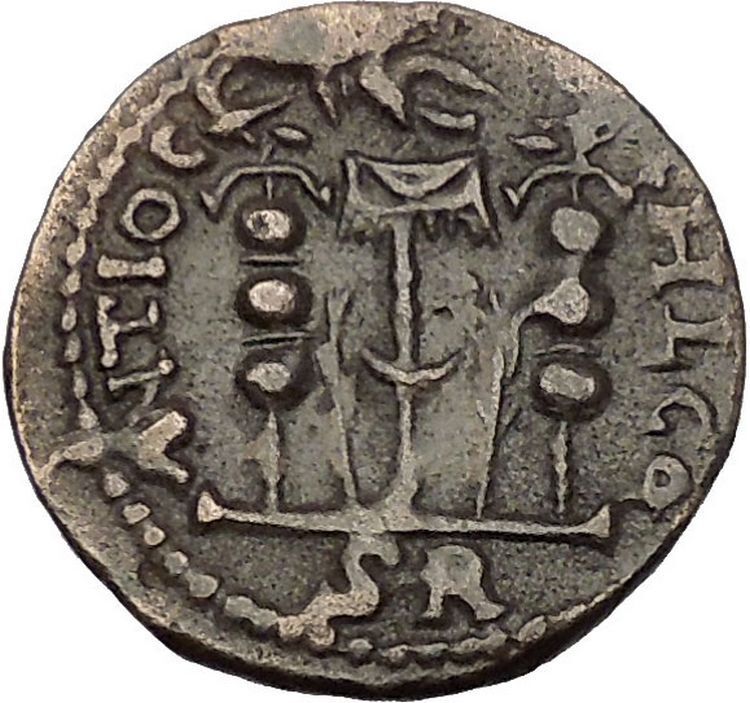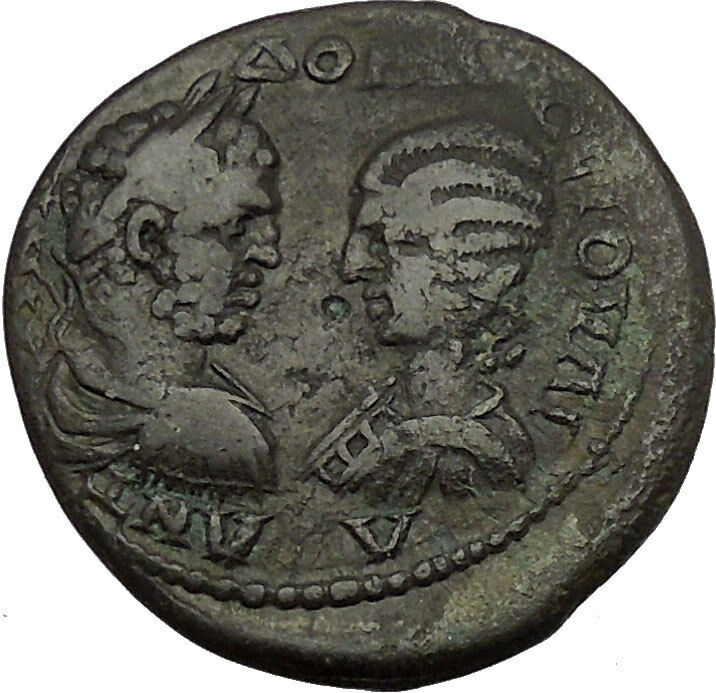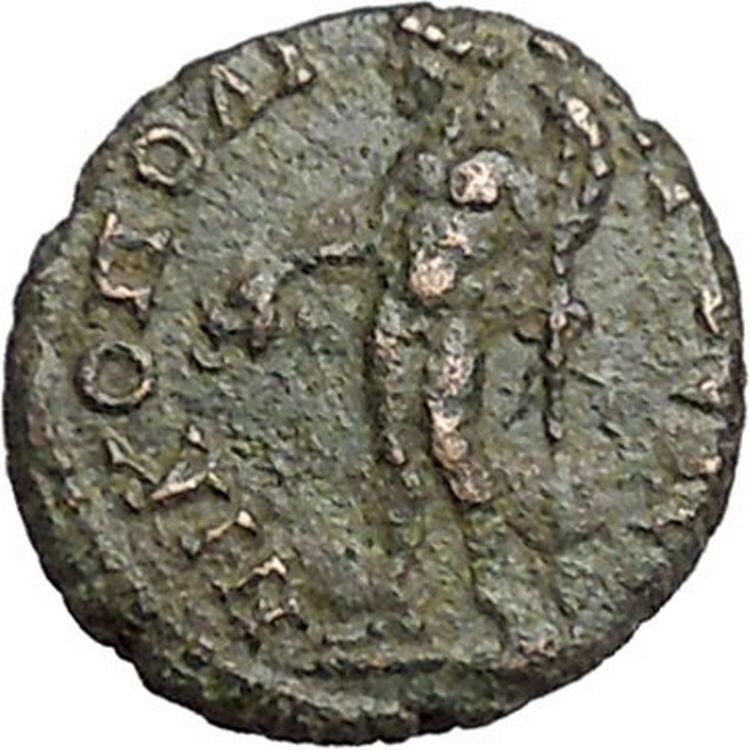|
Probus
–
Roman Emperor
: 276-282
A.D. –
Billon Tetradrachm 18mm (8.42 grams) of
Alexandria
in
Egypt
, Year 3 = 277/278 A.D.
Reference: Dattari 5529; Geissen 3132
A. K. M. AVP. ΠPOBOC CЄB, Laureate cuirassed bust right.
Eirine standing left holding olive branch and scepter,
L-Γ ( = regnal year 3 = 277/278 A.D.).
You
are bidding on the exact item pictured, provided with a
Certificate of Authenticity and Lifetime Guarantee of
Authenticity.
Eirene, or Irene Greek for “peace”;
the
Roman
equivalent was
Pax
, one of the
Horae
, was the
personification of peace, and was depicted in art as a
beautiful young woman carrying a
cornucopia
,
sceptre
and a torch or
rhyton
. She is said
sometimes to be the daughter of
Zeus
and
Themis
.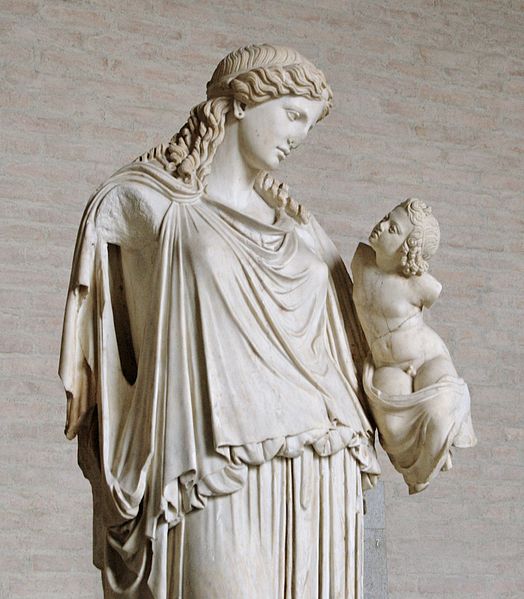
She was particularly well regarded by the
citizens of Athens
.
After a naval victory over
Sparta
in 375 BC, the
Athenians established a cult for Eirene, erecting
altars
to her. They
held an annual state sacrifice to her after 371 BC to
commemorate the
Common Peace
of that
year and set up a votive statue in her honour in the
Agora of Athens
. The
statue was executed in bronze by
Cephisodotus the Elder
,
likely the father or uncle of the famous sculptor
Praxiteles
. It was
acclaimed by the Athenians, who depicted it on vases and
coins.
Although the statue is now lost, it was copied in
marble by the Romans; one of the best surviving copies (right)
is in the
Munich
Glyptothek
. It depicts
the goddess carrying a child with her left arm –
Ploutos
, the god of
plenty and son of
Demeter
, the goddess of
agriculture. Eirene’s missing right hand once held a
sceptre. She is shown gazing maternally at Ploutos, who
is looking back at her trustingly. The statue is an
allegory for Plenty (Ploutos) prospering under the
protection of Peace (Eirene); it constituted a public
appeal to good sense. The copy in the Glyptothek was
originally in the collection of the
Villa Albani
in Rome
but was looted and taken to France by
Napoleon I
. Following
Napoleon’s fall, the statue was bought by
Ludwig I of Bavaria
.
Alexandria was founded by
Alexander the Great
in
April 331 BC as
Ἀλεξάνδρεια (Alexándreia). Alexander’s
chief architect
for the
project was
Dinocrates
. Alexandria
was intended to supersede
Naucratis
as a
Hellenistic
center in
Egypt, and to be the link between Greece and the rich
Nile Valley
. An
Egyptian city,
Rhakotis
, already
existed on the shore, and later gave its name to
Alexandria in the
Egyptian language
(Egyptian *Raˁ-Ḳāṭit, written rˁ-ḳṭy.t,
‘That which is built up’). It continued to exist as the
Egyptian quarter of the city. A few months after the
foundation, Alexander left Egypt and never returned to
his city. After Alexander’s departure, his viceroy,
Cleomenes
, continued
the expansion. Following a struggle with the other
successors of Alexander, his general
Ptolemy
succeeded in
bringing Alexander’s body to Alexandria.
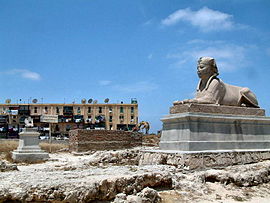
Alexandria, sphinx made of
pink granite
,
Ptolemaic
.
Although Cleomenes was mainly in charge of overseeing
Alexandria’s continuous development, the Heptastadion
and the mainland quarters seem to have been primarily
Ptolemaic work. Inheriting the trade of ruined
Tyre
and becoming the
centre of the new commerce between Europe and the
Arabian
and Indian
East, the city grew in less than a generation to be
larger than
Carthage
. In a century,
Alexandria had become the largest city in the world and,
for some centuries more, was second only to Rome. It
became Egypt’s main Greek city, with
Greek people
from
diverse backgrounds.
Alexandria was not only a centre of
Hellenism
, but was also
home to the largest Jewish community in the world. The
Septuagint
, a Greek
translation of the
Hebrew Bible
, was
produced there. The early Ptolemies kept it in order and
fostered the development of its museum into the leading
Hellenistic center of learning (Library
of Alexandria), but were careful to maintain
the distinction of its population’s three largest
ethnicities: Greek, Jewish, and
Egyptian
. From this
division arose much of the later turbulence, which began
to manifest itself under
Ptolemy Philopater
who
reigned from 221–204 BC. The reign of
Ptolemy VIII Physcon
from 144–116 BC was marked by purges and civil warfare.
The city passed formally under Roman jurisdiction in
80 BC, according to the will of
Ptolemy Alexander
, but
only after it had been under Roman influence for more
than a hundred years. It was captured by
Julius Caesar
in 47 BC
during a Roman intervention in the domestic civil war
between king
Ptolemy XIII
and his
advisers, and the fabled queen
Cleopatra VII
. It was
finally captured by
Octavian
, future
emperor
Augustus on 1
August 30 BC, with the name of the month later being
changed to August to commemorate his victory.
In AD 115, large parts of Alexandria were destroyed
during the
Kitos War
, which gave
Hadrian
and his
architect,
Decriannus
, an
opportunity to rebuild it. In 215, the
emperor
Caracalla
visited the
city and, because of some insulting
satires
that the
inhabitants had directed at him, abruptly commanded his
troops to
put to death
all youths
capable of bearing arms. On 21 July 365, Alexandria was
devastated by a
tsunami
(365
Crete earthquake), an event still annually
commemorated 17 hundred years later as a “day of
horror.” In the late 4th century, persecution of
pagans
by newly
Christian Romans had reached new levels of intensity. In
391, the Patriarch
Theophilus
destroyed
all pagan temples in Alexandria under orders from
Emperor
Theodosius I
. The
Brucheum
and Jewish
quarters were desolate in the 5th century. On the
mainland, life seemed to have centred in the vicinity of
the Serapeum and
Caesareum
, both of
which became
Christian churches
. The
Pharos
and
Heptastadium quarters, however, remained populous
and were left intact.
In 619, Alexandria
fell
to the
Sassanid Persians
.
Although the
Byzantine Emperor
Heraclius
recovered it
in 629, in 641 the Arabs under the general
Amr ibn al-As
captured
it during the
Muslim conquest of Egypt
,
after a siege that lasted 14 months.
Marcus
Aurelius Probus
(c. August 19,
232–September/October, 282) was a
Roman Emperor
(276–282).

A native of
Sirmium
(now
Sremska Mitrovica
,
Serbia
), in
Pannonia
, at an early age he entered the army, where
he distinguished himself under the Emperors
Valerian
,
Aurelian
and
Tacitus
. He was appointed governor of the East by
Tacitus, at whose death he was immediately proclaimed
his successor by the soldiers (276).
Florianus
, who had claimed to succeed his
half-brother Tacitus, was put to death by his own troops
after an indecisive campaign. Probus moved to the West,
defeated the Goths acquiring the title of Gothicus
(280), and saw his position ratified by the
Senate
.
The reign of Probus was mainly spent
in successful wars by which he re-established the
security of all the frontiers. The most important of
these operations were directed to clearing
Gaul
of German invaders (Franks,
Longiones
,
Alamanni
and
Burgundians
), allowing Probus to adopt the titles of
Gothicus Maximus and Germanicus Maximus.
One of his principles was never to allow the soldiers to
be idle, and to employ them in time of peace on useful
works, such as the planting of vineyards in Gaul,
Pannonia and other districts, in order to restart the
economy in these devastated lands.
In 279–280, Probus was, according to
Zosimus
, in
Raetia
,
Illyricum
and
Lycia
, where he fought the
Vandals
. In the same years, Probus’ generals
defeated the
Blemmyes
in
Egypt
; Probus ordered the reconstruction of bridges
and canals along the Nile, where the production of grain
for the Empire was centered.
In 280–281, Probus had also put down
three usurpers,
Julius Saturninus
,
Proculus
and
Bonosus
. The extent of these revolts is not clear,
but there are clues that they were not just local
problems.
In 281, the emperor was in Rome, where he celebrated his
triumph
.
Probus was eager to start his eastern
campaign, delayed by the revolts in the west. He left
Rome in 282, moving first towards Sirmium, his birth
city, when the news that
Marcus Aurelius Carus
, commander of the
Praetorian Guard
, had been proclaimed emperor
reached him. Probus sent some troops against the new
usurper, but when those troops changed sides and
supported Carus, Probus’s soldiers then assassinated him
(September/October 282).
|







